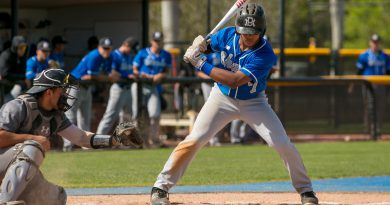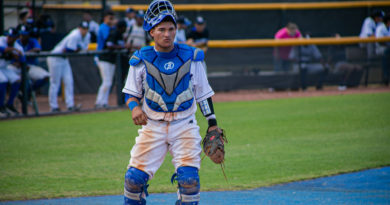How Writing Sports Stories Reconnected Me With My Grandpa
I’ve never had a passion for sports.
But baseball, it’s in my blood—I’m Cuban.
My grandpa, Francisco “Pipo” Valiente, was a baseball fanatic who played second-base in neighborhood ball games in Cuba.
When he was in his 80s, Pipo’s blood pressure would spike when he watched his favorite teams, the Miami Marlins and the New York Yankees, compete from the comfort of his reclining chair in Hialeah.
During our weekly domino tournaments, baseball games were a TV staple. I can still see my grandmother, Norma, who had Alzhiemer’s disease, tapping her index finger on the domino table.
“Pelota y pelota,” she would sigh. Baseball and baseball.
My grandfather died in 2017, but his passion for the old ball game left a mark on me.

When I started my tenure as editor-in-chief of The Reporter last year, I wanted to be involved in the paper’s baseball coverage, but since I didn’t know anything about sports, that fantasy was unlikely to become a reality.
But life always has a way of pushing you where it wants you.
My first sports story was on Mike Balado’s appointment as the head of Miami Dade College’s athletic department in August. It was one of my first times asking uncomfortable questions in an interview.
Balado had been fired from his previous job as Arkansas State University’s men’s head basketball coach.
It took 30 minutes worth of questions to address the matter, but the experience reaffirmed that as a journalist, you need to ask the tough questions.
The following month, I covered Lazaro Llanes’ appointment as the Sharks’ head baseball coach and Alex Fernandez’ appointment as the senior advisor to MDC athletics.
My heart wanted to pump out of my chest as I scooted onto the clay infield to interview Llanes, a former scout for the Marlins and the Milwaukee Brewers, and Fernandez, one of the greatest pitchers MDC has ever produced.
But as our conversations unfolded, their easy-going, down-to-earth personalities helped me see something many 21st century teens like myself need to be reminded of: people are just that—people.
As I covered more sports stories, I witnessed the influence sports have beyond the fields they are played on.
In December, I reported on the reopening of North Campus’ Demie Mainieri Field.
The famed field, which had been dormant for nearly three decades, honors MDC’s legendary coach Demie “Doc” Mainieri, who launched the baseball program at North Campus in 1960 and served as its head coach for 30 years.
Although the baseball giant accrued 1,012 wins in his career, I saw Mainieri’s true legacy in his players.
They remembered Mainieri as someone who taught them how to do their job without expecting a reward and to play baseball unselfishly.
“He taught you how to be a team member,” said Chicago Cubs scout Nick Belmonte, who played for Mainieri in the 70s.
To kick off the new year, I covered the first night game held at the Kendall Campus baseball field in its nearly 60-year history.
The energy was electric as eight 80-feet LED light towers illuminated the Sharks’ exhibition game versus St. Thomas University.
Sharks catching coach Rudy Arias, who played for the College from 1975-77, lit up as he spoke just before the first pitch as a rainbow hung over the field.
“Watching this right now, it’s such a beautiful thing,” Arias told me on the field that night.
I then switched gears and got the opportunity to report on Atavya Fowler, an MDC softball player with a custom shoe design business that has caught the eye of Major League Baseball players like Tampa Bay Rays outfielder Harold Ramirez and St. Louis Cardinal’s catcher Iván Herrera.
But the story that has touched me the most was an obituary on beloved coach Charlie Greene.
The 94-year-old, who spearheaded the baseball program at Kendall Campus and served as its head coach for three decades, died on March 13.
Although I didn’t meet Coach Greene when he was alive, I met him through the memories of the people he impacted.
Players like former New York Yankees pitcher Gil Paterson, who grew up without a dad, saw Greene as a father figure and staunch advocate for timeliness, camaraderie and integrity.
“He was disciplined…I was late for the bus one minute and he didn’t want to take me on when we went to play in the playoffs. [I was] like, ‘What? I’m your best pitcher!’ He said, ‘I don’t care, I don’t care,’” Paterson recalls. “He cared, but I’ll tell you what, he wanted it done the right way.”
My reporting has allowed me to see the baseball diamond as an arena that fosters relationships and teaches life lessons.
I bet my grandpa would agree.





